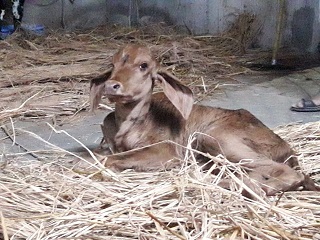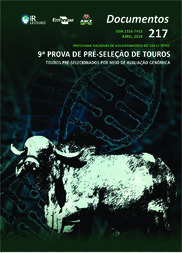Embrapa supports breeding program for Indigenous cows in India
Embrapa supports breeding program for Indigenous cows in India
This week, the birth of two heifers in the Indian city of Anand through in vitro fertilization (IVF) was featured in The Times of India, one of the largest and more traditional newspapers of India, and the one with the largest circulation in the English language. The work's success was possible thanks to the support of the researchers from Embrapa Dairy Cattle Luiz Gustavo Siqueira and Luiz Sérgio Camargo. They visited India in March 2018, upon invitation from the National Dairy Development Board (NDBB), a company created in the 1960s by the Indian government to support dairy farmers and organizations from the dairy sector. Siqueira and Camargo trained technicians and helped to set up an animal reproduction laboratory at the institution. On that occasion, they produced and transferred the first embryos, which culminated in the birth of two heifers, one of the Gir breed and the other, a Sahiwal one.
Despite being of Indian origin, the genetic improvement program for Gir, a breed brought to Brazil in the 1930s, is very successful. Due to cultural issues in India, which hinder the culling of bovines, their breeding programs cannot be as intensive as ours”, Siqueira explained. The head of Research and Development of Embrapa Dairy Cattle, Pedro Arcuri, underscores that the Indians intend to use Embrapa's expertise to increase that country's milk yield. Arcuri quotes NDBB's chairman Dilip Rath's own words published in The Times of India to illustrate the importance of the partnership that has been carried out by the two institutions. “Embrapa's experience and success are going to help India obtain excellent Gir genetics from Brazil”.
Broadening the partnership - The head of Technology Transfer of Embrapa Dairy Cattle, Bruno Carvalho, reinforces that the news featured in the Indian press is a result of the understandings between Embrapa and NDBB, which have already been conducted for some time. According to him, the Indian government's intention is to further expand the partnership. “We have recently received an official note from the Brazilian attaché in India with a proposal to enhance the technical cooperation program, in order to train more technicians in IVF and genomics in Brazil. They also asked for support towards building a center of excellence about Gir in India”, he stated. In February, an Indian mission will visit Embrapa to initiate discussions about furthering agreements between the institutions.
Carvalho recalls that the partnership with NDBB started about five years ago, when Embrapa researchers participated in an event by the Bill & Melinda Gates Foundation in Rio de Janeiro with the presence of the director of the Indian institution, who requested a visit to Embrapa Dairy Cattle to learn about the Gir breeding work more closely. Since then, contacts have intensified. In 2017, Bruno Carvalho and Luiz Sérgio Camargo went to India to discuss aspects of the technical cooperation agreement, which was signed at the end of that year, with the visit of Indian officers and researchers to Brazil. In that same year, two NDBB technicians spent three weeks in training at Embrapa Dairy Cattle, and in March, 2018, Luiz Gustavo Siqueira and Luiz Sérgio Camargo went to Anand to train six more technicians and support the beginning of the operations of the reproduction laboratory newly established by the institution, an occasion when the work of producing the newborn heifers was conducted. “The mutual work of liaison and knowledge is going to provide important advances in the research works of both countries”, Pedro Arcuri anticipates.
Translation: Mariana Medeiros
Marcos La Falce
Embrapa Dairy Cattle
Further information on the topic
Citizen Attention Service (SAC)
www.embrapa.br/contact-us/sac/


